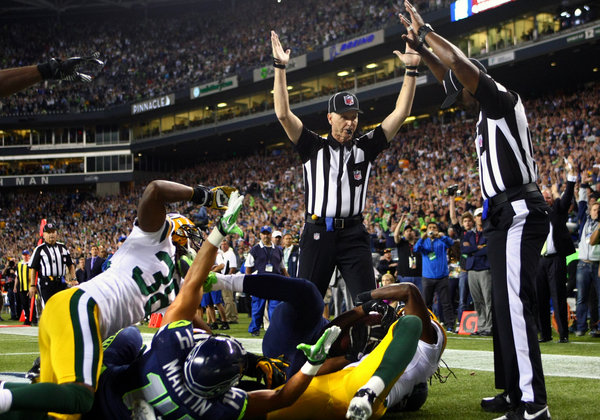It’s not a particularly good photograph, but it’s spot on as a metaphor for Republican ideology.
The caption could read, “Scab referees blow the biggest call of the Seattle-Green Bay game.” One of these replacement workers is signalling a touchdown, as if the Seattle Seahawk receiver had caught the ball, while the other one is signaling a touchback, as if the Green Bay Packer defender had caught the ball, which he did. Earlier in the play, the receiver had committed offensive interference, which was not called. I probably don’t need to mention that this was the final play of the game and that it decided the outcome.
The reason competent referees are on the field is that the NFL owners have locked them out. Anyone can do their job, right? Well, no, not even close. The lack of competence and the corresponding deterioration of the game has been evident from the start, and it has gotten worse, not better, as the weeks have gone by and the stakes have gotten higher. Monday night’s incident may break the stalemate, as now Everyone is incensed and saying so. I hope the pros are let back onto the field, but once that happens a teachable moment will be over.
What the referee lockout demonstrates is nothing less than the stupidity of excessive deregulation. Referees are regulators, after all: nothing more and nothing less. And their work is very important: if the players (and coaches, are you listening New Orleans?) don’t follow the rules, you don’t have a more aggressive or competitive or entrepreneurial game–you don’t have a game at all. More to the point, those who are watching the game–people like spectators and investors–lose confidence in it and go elsewhere.
So, the refs need to be there, and they need to be competent and have sufficient enforcement power and have adequate resources such as good salaries and pensions so that they can work effectively and without corruption. When they work well, you largely don’t see them, although someone is always a bit aggrieved because they got caught, and everyone can prosper. When they don’t work well, just about everybody loses.
Business culture loves to compare business to sports. The CEO is the quarterback, we’re all on the team, discipline and hard work and uniforms are expected, . . . you know the score. But the comparison disappears the minute government regulation comes up. Then we are to pretend that no rules are necessary, that any regulators should be underfunded lest they become tyrants, and that rules benefit only the weak and not the strong. Tell that to the Packer who actually caught the ball.
As a friend likes to remark, we need fair markets, not free markets, because there is no such thing as a free market. The choice is between fair markets and unfair markets, good referees or putzes. Only then is the better athlete likely to win, and only then can other people trust the game.
Which brings us back to the photograph. It might seem to be a bad photo, and certainly so by the standards of sports photography. The focus isn’t on the players, who are clumped awkwardly after the play has ended. The refs call for attention, but because one is looking at the other whose face is obscured, the focus is diffused there as well. And then there is everything and everyone else: the background is packed with other figures, tiered masses of spectators, stadium decor and signage, and even a stray hand waving in the upper left. Contrast this with the daily output of high definition, close-cropped, freeze-framed dramatic clashes and balletic action shots, and there’s no contest.
Nonetheless, it’s a good photograph. As we’ve noted elsewhere, photographing economic realities may require giving up other aesthetic conventions to get inside banal, ordinary, everyday experience. That’s where the work is, and that’s where the damage is done when the Lords of Finance and their ideologues rig the game. By capturing how the decisive competitive moment actually depends on competent application of a set of rules, and how not just the few players but the general welfare benefits from fairness, the photograph provides a lesson in how a modern society should be governed if it is to have sustainable prosperity.
And so maybe life is like sports. If you want to enjoy the game, there have to be rules and people paid to enforce them. If you’re not adult enough to understand that, fine, take your ball and go home. But don’t spoil it for the rest of us.
Photograph by Joshua Trujillo/seattlepi.com, via Associated Press. You can read more about the incident here.

It’s certainly an apt metaphor. And, surely you appreciated the calls to bring back the professional officials–unionized group that they are–from Wisconsin Governor Scott Walker: http://sports.espn.go.com/espn/wire?section=nfl&id=8423222